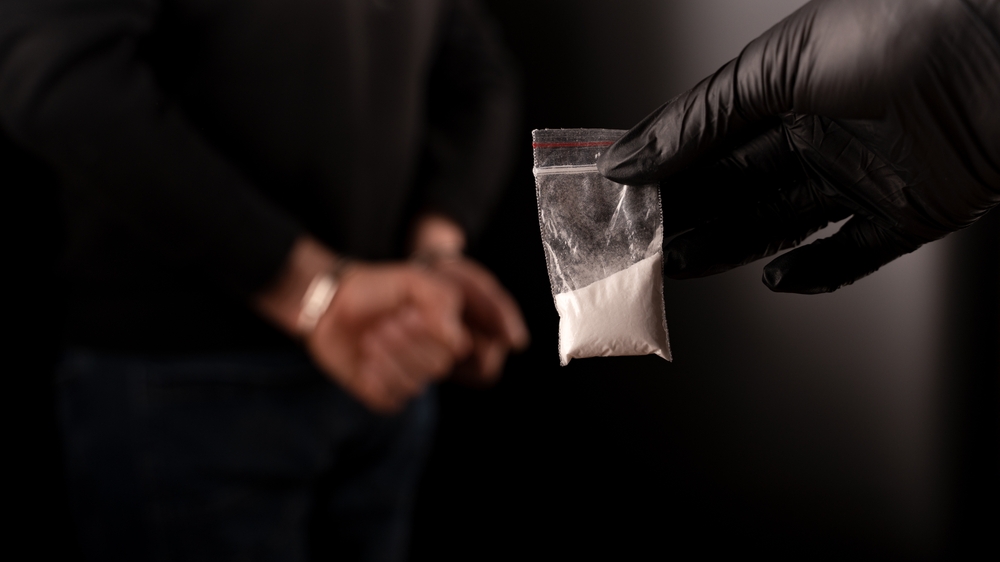Avoiding Common Mistakes After Being Charged With a Drug Crime

Getting arrested and charged with a drug crime in California is often an overwhelming, intimidating, and terrifying experience.
Most people are often not familiar with the charges accompanying a drug crime. They are unaware of the legal consequences they could face of how best to protect their rights when defending themselves against drug charges.
Having the help of a skilled and experienced drug crime defense attorney will help create the best defense possible for your case.
Our attorneys at Rodriguez Law Group provide strong and reliable defenses for our California clients. Contact us today at (213) 995-6767 to schedule your free and confidential initial consultation with our well-respected and experienced team of drug crime defense attorneys.
What Is a Drug Crime in California?
 Being charged with a drug crime in California can be a challenging and complex situation to try and navigate.
Being charged with a drug crime in California can be a challenging and complex situation to try and navigate.
The laws and legislation around prescription and illicit drugs are complicated and can be confusing for most people to understand.
Law enforcement can charge people in California with multiple types of drug crimes.
Driving Under the Influence (DUI)
While most people assume a DUI is only associated with alcohol, a person can be arrested for and charged with a DUI if they are driving under the influence of drugs.
Under California legislation, it is illegal for a person to drive a vehicle under the influence of any drugs. This refers to any drug that can impair a person’s ability to properly operate their vehicle, including illicit drugs, prescription drugs, and over-the-counter medications.
Possession
It is illegal to be in possession of a controlled substance in the state of California, which refers to both illicit drugs as well as prescription drugs for which a person does not have a valid prescription.
Law enforcement typically charges a person with drug possession when law enforcement believes the person has custody of a controlled substance for personal use without the intention to sell or distribute it.
Law enforcement can also charge a person with possession of drug paraphernalia, which applies to any device or material that the person intends to use for consuming, distributing, or manufacturing a controlled substance.
Possession of a drug and drug paraphernalia can fall under two classifications:
Actual possession
Actual possession means the drugs were found directly or immediately within a person’s possession.
This is common when law enforcement finds drugs on a person, usually in their hand or pocket.
Constructive possession
Constructive possession is when a person has actual control of a drug, even if it is not under their physical control or actual possession at the time. This type of possession commonly applies when law enforcement finds drugs in a shared space and law enforcement believes the person knows of their presence.
Examples of constructive possession are when law enforcement discovers drugs in a shared car, a shared home, or another shared space.
Distribution
Distribution of or the intent to distribute controlled substances is illegal in California. It typically carries a heavier penalty than being charged with possession.
People are commonly charged with distribution when law enforcement catches them in possession of a controlled substance in a way that is evident they intend to sell or distribute the drug.
Common factors that indicate a person most likely intends to sell or distribute a controlled substance include
- The person is in possession of a large quantity of a drug that law enforcement could not reasonably deem the person will use for personal consumption
- Large amounts of money are present
- Law enforcement finds drug paraphernalia in a person’s possession
- Drug packaging materials are discovered, like small plastic bags or scales
- Evidence of communications with customers or suppliers exists, commonly in the form of text messages or witnesses
The distribution charge’s severity varies depending on the drug type and the degree of intended or actual distribution.
Distribution of Narcotics
Being charged with the intent to sell certain controlled substances or narcotics, like heroin or cocaine, is punishable by fines and up to four years in prison in California.
Distribution of Cannabis or THC Products
While cannabis and other tetrahydrocannabinol (THC) products have been made legal in California, being caught with the intention of illegally selling or distributing cannabis or THC products can be punishable by fines and as many as three years in prison.
Transportation or Trafficking
Trafficking and transporting controlled substances in California is illegal.
Transporting is typically deemed to be caught moving a smaller quantity of a controlled substance or substances that are understood to be for personal use, while drug trafficking refers to the movement of larger amounts of a controlled substance or substances that law enforcement understands are intended to be distributed or sold.
A drug trafficking charge carries more severe penalties than a drug transportation charge.
Manufacturing or Cultivating
It is illegal to manufacture, produce, or process controlled substances in the state of California.
It is also a crime to cultivate and grow marijuana in the state illegally.
If you or your loved one are facing a drug crime charge in California, contact our diligent team of lawyers at Rodriguez Law Group today to get the help you deserve in your defense.
What Is a Controlled Substance?
The National Library of Medicine (NLM) defines a controlled substance as a medication or illicit drug that is active in the central nervous system and can result in a physical and mental dependence that might lead to addiction. The NLM further elaborates that controlled substances can have significant adverse health consequences and large doses.
The California Health and Safety Code classifies controlled substances into five schedules.
Schedule I
According to the United States Drug Enforcement Administration (DEA), Schedule I drugs generally have no currently acceptable medicinal application and are likely to be abused. Examples include peyote, heroin, cocaine, marijuana, psilocybin, and LSD.
Schedule II
Substances included in Schedule II have a significant likelihood of being abused with the potential to cause a form of psychological or physical dependence. Types of Schedule II substances include raw opium, codeine, hydrocodone, and morphine.
Schedule III
Schedule III contains substances that have a low likelihood of psychological or physical dependence. This includes ketamine and steroids.
Schedule IV
Controlled substances listed in Schedule IV have a low potential for dependency and abuse. Common examples are diazepam and flurazepam.
Schedule V
Substances contained in Schedule V have a lower chance of dependency than Schedule IV substances. They are mixtures of limited quantities of specific narcotics, including low doses of codeine or opium.
How to Avoid Common Mistakes After Being Charged With a Drug Crime in California
People commonly feel distraught and nervous after being charged with a drug crime in California. Most people and their loved ones are often unsure of the proper way to build a strong defense against these serious charges.
Taking the proper steps after being arrested for a drug crime in California will help protect your rights.
Do Not Accept the Initial Offer
Do not accept any offers from the prosecution’s team in the immediate aftermath of being arrested and charged with a drug crime.
Most prosecution teams utilize strategic tactics to intimidate defendants and try to persuade them it is in their best interest to plead guilty to their charges and accept the prosecution’s first offer.
By succumbing to the prosecution’s pressure, you risk putting yourself at a legal disadvantage that could hurt your case. This could lead to more severe penalties both immediately and down the road.
Work With an Attorney
It is vital to find the help of a trusted and well-versed drug crime defense attorney in California immediately after being arrested and charged with a drug crime.
An experienced legal team will ensure you protect your rights during this complicated and nerve-wracking time.
A competent and trustworthy team of attorneys will also build a strong defense in your case. They will thoroughly investigate and study all aspects of your defense, including
- Defining possession and establishing if legal possession exists
- Demonstrating a lack of knowledge of illegal possession
- Determining if any of your constitutional rights were violated
- Proving if there was a lack of intention to sell or distribute
Your knowledgeable legal team will advocate and negotiate on your behalf to try and reduce the legal repercussions imposed upon you for your drug crime, including
- Duration of probation
- Duration of incarceration
- Amount of fines
- Length of required drug-treatment plan
Why Choose Rodriguez Law Group for My Drug Crime Case in California?
Getting charged with a drug crime in California can be a stressful and intimidating experience. Most people are unsure of where to turn for help defending themselves against these charges.
Having an established and experienced California defense attorney on your team will help set you up for the best possible results for your case.
Ambrosio E. Rodriguez founded Rodriguez Law Group to give his Los Angeles community a powerful and assertive defense option.
Mr. Rodriguez spent 13 years working tirelessly as Senior Deputy District Attorney and earned 20 years of experience in criminal defense. His years working as a prosecutor have given him invaluable knowledge of how to build an aggressive defense against Los Angeles prosecutors.
Mr. Rodriguez’s legal experience is well-respected nationwide, and he has been regularly featured in national news interviews to demonstrate his skillset on relative matters.
Our attorneys at Rodriguez Law Group will fight unwaveringly in your defense to advocate for your rights and protect your freedom throughout your entire case.
To better serve the larger Los Angeles community, our firm has a team of English, Spanish, and Arabic-speaking attorneys.
We also offer a virtual consultation option to make our team more accessible to your needs.
The unyielding team of reliable attorneys at Rodriguez Law Group has a successful track record of defending thousands of cases for their local community.
We have experience successfully negotiating down plea bargains and getting certain cases dismissed.
Previous clients of Rodriguez Law Group regularly share their gratitude with our team for our successful defense of their cases.
Our recent client, Danny, expressed how worried he was about finding a well-experienced lawyer for his son’s defense case. He was relieved by his experience working with Rodriguez Law Group and beyond pleased with the timeliness of his family’s case resolution.
Joselyn felt lucky to have found our team of experienced attorneys. We maintained clear and consistent communication throughout her case, making the process smooth and seamless for her and her family.
Karla was pleased with how simple and easy we made the defense process for her.
Our Los Angeles office is conveniently located downtown at the corner of Wilshire Boulevard and South Hope Street. We are just a few blocks from Pershing Square, Maguire Gardens, and the Los Angeles Central Library.
Call us today to schedule your free consultation with a trusted team member.
Drug Crimes in California
 A recent report published by the California Department of Justice and the Office of the Attorney General states that the amount of violent and drug offense convictions in California in one recent year that resulted in incarceration had increased from the previous year.
A recent report published by the California Department of Justice and the Office of the Attorney General states that the amount of violent and drug offense convictions in California in one recent year that resulted in incarceration had increased from the previous year.
The arrest rate per 100,000 people for a felony drug offense in California that same year was 14.6 percent, with the arrest rate for dangerous drugs at 19.4 percent, and the arrest rate for marijuana at 18.5 percent.
The report cites the passing of Proposition 64 in November 2016, legalizing the possession and use of marijuana in California for people age 21 and older, as a catalyst in the reduction of marijuana-related offenses in the state.
According to the California Office of Transportation Safety (OTS), 751 drug-impaired driving fatalities occurred in one recent year.
Work With a Dependable Drug Crime Defense Attorney
Most people feel overwhelmed after being arrested and charged with a drug crime. They are unsure what to do next to defend themselves against these severe and potentially life-changing charges properly.
Working with a dependable drug crime defense attorney will protect your rights and help you prepare the best defense for your case.
The distinguished attorneys at Rodriguez Law Group are passionate about helping their California community with drug crime defense cases.
Our diligent team will work relentlessly on your case to bring you the best results possible, easing the stress of you and your loved ones during your difficult times.
Our Los Angeles office is conveniently located downtown at the corner of Wilshire Boulevard and South Hope Street. We are just a few blocks from Pershing Square, Maguire Gardens, and the Los Angeles Central Library.
Contact us today at (213) 995-6767 to schedule your free and confidential initial consultation with our skilled and knowledgeable team of criminal defense lawyers.


